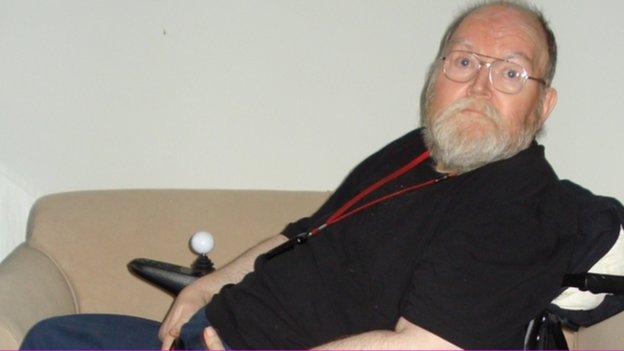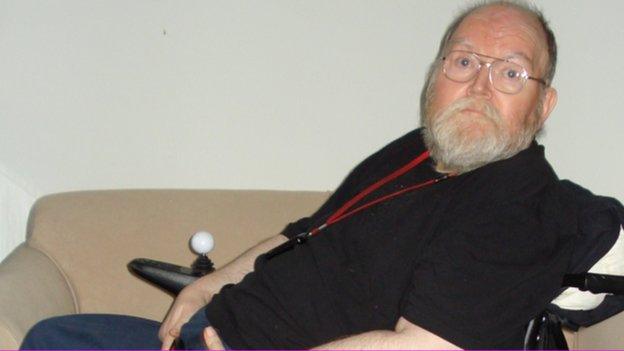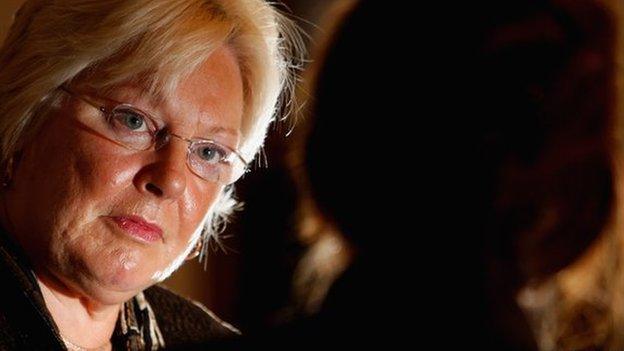Disabled grandfather brings 'right to die' case to court
- Published

Former TV producer Gordon Ross currently lives in a care home in Glasgow
A severely disabled grandfather has had his case seeking the right to die heard by the Court of Session.
Gordon Ross, 66, said he hoped the judicial review would clarify the legal position regarding assisted suicide.
He has called on the Lord Advocate to issue guidance that makes clear whether any person who helps him end his life would be charged with an offence.
Judge Lord Doherty reserved his decision in the action and will give a ruling at a later date.
The Director of Public Prosecutions has issued guidelines for England but these do not apply to Scotland.
Campaigners opposed to assisted suicide argue that changing the law would be a "catastrophe" in terms of how society confronts illness and disability, as well as "devaluing" suicide prevention efforts.
But Mr Ross said he believes that the present legal situation "encourages suicide" and discriminated against people with a disability.
'Significant flaws'
While he did not attend the hearing in person due to poor health, supporters of the pensioner's case staged a demonstration outside the court in Edinburgh's Parliament Square.
Campaigners have previously urged MSPs to pass the Assisted Suicide Bill which was introduced to Holyrood by the late MSP Margo Macdonald, and which is currently being taken forward by Scottish Green MSP Patrick Harvie.
Gordon Ross says the law discriminates against disabled people
A Holyrood committee recently concluded that the bill contained "significant flaws" and opposed its general principles, but said the full parliament should decide whether or not to throw out the proposed legislation.
Mr Ross, a former TV producer lives in a care home in Glasgow, suffers from several serious medical conditions including Parkinson's disease and loss of sensation in his arms and legs.
He is unable to walk and uses a wheelchair, and cannot feed or dress himself or attend to his personal needs.
Explaining his decision to bring the case, Mr Ross said he fears that, should a time come when he has "had enough", he will not be capable of ending his life without help - unlike an able-bodied person.
He said: "I believe that, as a disabled person, I am currently being discriminated against. Anyone else, in any circumstances, can choose to end their own lives at any time. Because of my disability that is something I am unable to do.
"I do not wish to end my life, I want it to go on as long as I can. However, if my condition deteriorates to the point that I do want to take that action, I want to know what action the law might take were someone to assist me."

By Reevel Alderson, BBC Scotland home affairs correspondent
Gordon Ross is quite clear: he does not want to die.
As a committed nationalist, he says he is looking forward to the Holyrood election in 2016 and possibly a further independence referendum.
But he knows he may not see that happening.
The 66-year-old grandfather lives in a care home on the south side of Glasgow, where his disabilities mean he requires help for all of his personal needs - including feeding and drinking.
He suffers from Parkinson's disease, which gives him violent shaking fits, leaving him weak and exhausted.
He also has a condition which has damaged his nervous system, meaning he has no feeling in his hands or feet.

Mr Ross also argued that the current legal position encourages suicide.
He said: "Amongst those with conditions such as mine, people might choose to take their own life before they would otherwise want to because they know they won't be able to in future.
"Ending life early in such circumstances is tragic and the law should not be putting up barriers to prevent people from living longer.
"I hope the court will consider this and compel the Lord Advocate to issue guidance, as exists in England, as to what support can or cannot be given to people in situations such as mine."
'Vulnerable majority'
Mr Ross's counsel Aidan O'Neill QC said: "The present application is based on the submission that the refusal by the Lord Advocate to set out policy guidelines is unlawful because it's incompatible in respect of the convention rights."
Lawyers for the Lord Advocate dispute the claims and further argue that it would be inappropriate for the court to make any order while the Assisted Suicide (Scotland) Bill is still being considered at the Scottish Parliament.
Gerry Moynihan QC told Judge Lord Doherty: "There is no lack of clarity."
"The Lord Advocate is being asked to produce guidelines on prosecution for assisted suicide. We do not prosecute for assisted suicide. We prosecute for murder or culpable homicide," he said.
He added: "To say anything else is to give people a false expectation of immunity from prosecution. That is an illusion."
Reserving his decision to a later date, Lord Doherty thanked counsel for their submissions "in this interesting and important case".
Legalisation proposals
Campaigners from Friends At The End (FATE) earlier demonstrated outside the court in support of Mr Ross.
Spokesman Dr Bob Scott said: "Gordon is suffering unnecessarily because of doubt and uncertainty. It would be reassuring for him and comforting for him to know that the rights and wrongs of his position were clarified in law."
Proposals to legalise assisted suicide are being considered in parallel at Holyrood.
The Scottish Parliament's Health Committee recently said the plans were flawed and face "major challenges" going forward.
It added that while the majority of its members did not support the general principles of the Assisted Suicide Bill, it would make no formal recommendation to Parliament on the legislation as it was a matter of conscience.
Dr Gordon Macdonald of Care Not Killing, the umbrella group spearheading opposition to the proposed assisted suicide legislation, said: "In today's individualistic society the pressures on sick, disabled and elderly people to avoid placing 'unfair burdens' on others are very great.
"Maintaining the law's protection of this silent and vulnerable majority is more important than giving choices to a minority of strong-minded and highly resolute people."
- Published14 May 2015

- Published4 June 2014
